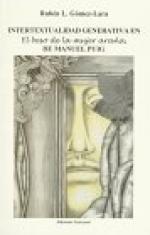|
This section contains 6,622 words (approx. 23 pages at 300 words per page) |

|
SOURCE: “Psychoanalysis, Gender, and Angelic Truth in Manuel Puig's Pubis Angelical,” in Modern Language Review, Vol. 93, No. 2, April, 1998, pp. 400-10.
In the following essay, Davies discusses the role of psychoanalytic theory and gender conflict in Puig's Pubis angelical. He concludes that “Though Puig trifles with the conventions and mocks the excesses of psychoanalytic and feminist discourses, he does not repudiate them. …”
Puig's fifth novel, Pubis angelical, published in 1979, has not attracted the attention, let alone the critical acclaim, that greeted his earlier works, notably Boquitas pintadas (1969) and El beso de la mujer araña (1976). For some critics, Pubis angelical is an early indication of the author's literary decline, which was purportedly confirmed by such works as Sangre de amor correspondido (1984).1 The relative neglect of the work can be attributed in part to its complexity; the tripartite structure is difficult to get to grips with. The text's intricate relationship...
|
This section contains 6,622 words (approx. 23 pages at 300 words per page) |

|


